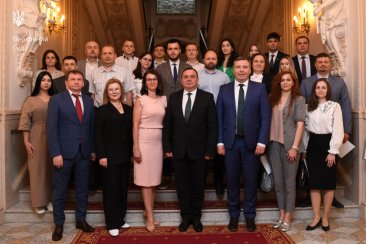Contact center of the Ukrainian Judiciary 044 207-35-46

In the current circumstances, it is necessary to look for new approaches to the interaction between the judiciary and higher legal education institutions and to strengthen cooperation between students, academics and practitioners, as this will help to improve the efficiency of both the educational process and the work of the courts.
This opinion was expressed by Supreme Court President Stanislav Kravchenko during the presentation of the concept of cooperation between the Supreme Court and higher legal education institutions.
The key objectives of such cooperation include the formation of a modern legal outlook of future lawyers, mutual exchange of knowledge between representatives of the judiciary and law schools, formation of a potential personnel reserve for the Supreme Court, as well as increasing trust in the judiciary and strengthening its authority.
.jpg)
The event was attended by Vitalii Urkevych, Secretary of the Grand Chamber of the Supreme Court, Oleh Tkachuk, Judge of the Supreme Court's Grand Chamber, Scientific Secretary of the Scientific Advisory Council of the Supreme Court, and Dmytro Hudyma, Supreme Court Judge of the Civil Cassation Court, Rasim Babanly, First Deputy Chief of Staff of the Supreme Court, as well as representatives of Taras Shevchenko National University of Kyiv, Yaroslav Mudryi National Law University, National University of Kyiv-Mohyla Academy, V. N. Karazin Kharkiv National University, the Ukrainian Catholic University, the National University of Ostroh Academy, Leonid Yuzkov Khmelnytskyi University of Management and Law, and the National University of Life and Environmental Sciences of Ukraine, including representatives of the student self-government bodies of these educational institutions.
Memoranda of cooperation were signed between the Supreme Court and these universities, which marked the beginning of fundamental work on improving legal education, introducing new effective practices in the educational process and professional training of future lawyers.
The specific aspects and forms of further cooperation, as well as the roadmap for the implementation of the project, will be discussed at further meetings.
.jpg)
.jpg)
.jpg)
.jpg)
.jpg)
.jpg)
.jpg)
.jpg)
.jpg)
.jpg)